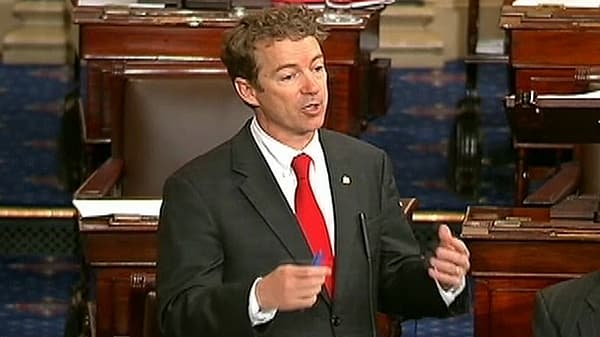With the Senate thinking the unthinkable—a "nuclear option" on filibusters—you may have to factor in politics before making your next investment.
Senate Majority Leader Harry Reid (D-Nev.) has threatened to change Senate rules and weaken the filibuster, which is the principal way that the minority party preserves power. It has been used with increasing frequency in recent years, with Republicans using it to prevent the confirmation of agency heads. In response, Reid argued on NBC's "Meet the Press" that a rule change that would make it impossible to filibuster executive branch is warranted.
Abolishing the filibuster is referred to as the purposely scary-sounding "nuclear option," and it could have a dramatic impact on the market. In fact, Lawrence McDonald, Newedge Group's senior director of credit sales and trading, calls the nuclear option the "top risk [to the market] this week."
In response to Reid invoking the nuclear option, "Republicans would counter, refusing to play ball with any Democratic wishes, turning gridlock into grid meltdown, and possibly a government shutdown," McDonald wrote. "Negotiations around the grand bargain, tax reform, and the debt ceiling could fall apart."
(Read More: Senate leaders in deal to (sort of) muzzle filibusters)
But Wendy Schiller, associate professor of political science and public policy at Brown University, says main street businesses, not Wall Street, should be worried.
"Wall Street doesn't want to see a government shutdown, and Wall Street doesn't want to see a government default," Schiller said. And because Wall Street is such a massive supporter of the GOP, "the Republican party simply won't allow the economy to go over the cliff," even if that means compromising with Democrats.
Besides, Schiller notes, it's hard to imagine Congress becoming even less productive, even if the nuclear option is invoked. "This is the least-performing Congress in history," Schiller said. "There's so little productivity that the idea that one or two actions now will trigger no cooperation in the future. ... There's no cooperation now!"
But Schiller maintains that "every business in the country should care about this." Since the appointees that Republicans are trying to block include the heads of regulatory agencies such as the Consumer Financial Protection Bureau, the end of filibusters for executive branch nominees "will mean a huge increase in future regulations."












